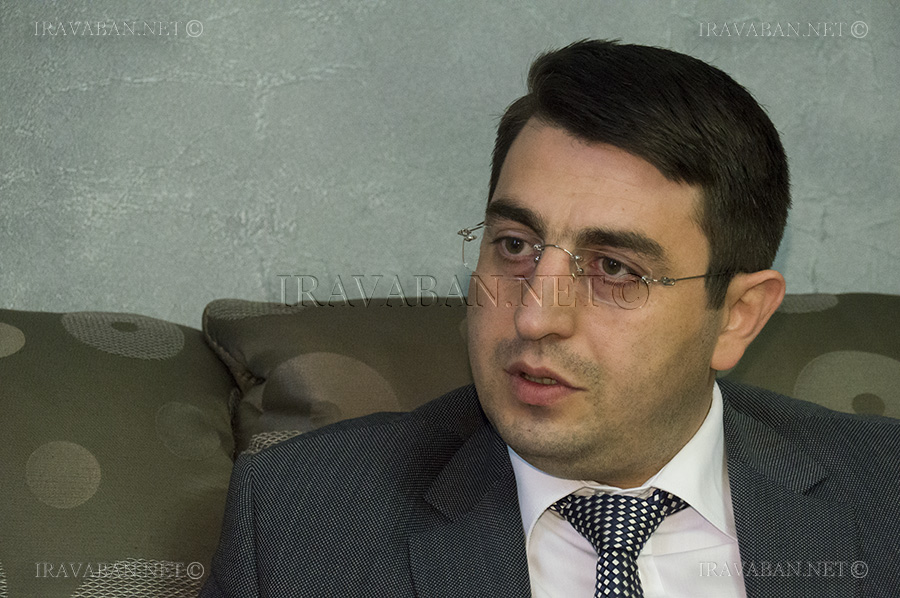The RA School of Advocates functions since 2012. Simon Babayan, the Director of the School of Advocates believes that it is the first in its sort in the region. We spoke about the activities of the educational institution, its innovations and problems with the Director Simon Babayan.
How are the exams conducted?
The entrance examinations conducted by the test method. Prior to the examinations the entrants are provided the workbook, which includes the questions on the legal sphere. The entrants study it in the duration of one month and then come to the examination. There are 150 questions in the workbook and the entrant must answer to no less than 100 questions. However this is still not enough to enter the school, the number of the entrants is also important. Tests are checked by the computer program, which minimizes minimal risk of forging the answers. In 2013, only 14 from overall 90 entrants were willing to specialize in criminal orientation stream. Such deviations in numbers caused problems and that is why we decided to separate these and now the examinations are held separately.
Were there results?
Of course, though the scores of competition are different. The admission score in the Spring stream of Criminal Law was 129 points, this year it was 109. In Civil Law stream it was 139 in Spring, this year it was 130. The reason is that the competition in the Civil Law stream is larger. The more is the demand, severer are the competition conditions.
Who are your students?
Any person with higher legal education can become our student. Employees of the state structures are also accepted in our school. If a person has 5 years of legal practice, he is provided opportunity to study in simplified procedure, and considering his/her work experience they are provided opportunity to study for six months instead of one year. We also have “special applicants,” they are the holders of academic degree, PhDs, judges, prosecutors, and advocates with work experience of 10 years, They are admitted to school without the entrance examinations, but are obliged to pass the qualification exams to receive the license of advocate.
Can a graduate of a higher educational establishment with another profile who had then studied law in any law institute become your student?
Yes, the primary condition for becoming the student of our school is higher legal education, both public and private, is not important.
How many students do you have each year?
The reception is held twice in a year, and around 60-65 students finish the school during each cycle, it makes about 120 – 130 people in one year.
What is the format of your courses?
Since our students are people with the legal educated people, we emphasize practical skills. We do not teach theories; we teach what the lawyer should do while carrying out his professional activities. We send him on a business visit to law firms with specific tasks.
Were there cases when your students failed to perform the task and did not graduate from the school?
Yes we have had such 7 or 8 students. Starting yesterday we decided to hold routine examinations on a three week basis, on a 20 point system, which will have legal consequences. In case of unsatisfactory points the student will be excluded from the school.
Do you have foreign students or students of other nationalities?
No students of other nationality, but we have students of Armenian origin from foreign countries, major part are from Russia. Notably last year legislative reforms took place in NKR. Now, if an advocate from NKR wants to receive an advocate’s license he/she must pass training at the school of advocates. We conduct distance trainings as well with the advocates from NKR on preferential terms and provide two free of charge places.
How many advocates and from which marzes participate in the distance training?
Total 10 advocates. 2 from NKR, 2 from Tavush, 2 from Lori, 2 from Syunik, 1 from Vayots Dzor and 1 from Shirak marzes.
What problems does the school have?
The complete implementation of distance training. We have financing from the World Bank to implement it, but it is a time consuming problem and I think we shall have the problem completely solved in a year.
Which are the primary problems for the advocates in the Republic of Armenia?
Advocates have a lot of problems. We cannot separate them, because the problems that the community has are the problems of the advocates as well. The overload of the Public Defender’s Office is a big problem. The office has only 60 public defenders that cover the whole territory of the RA. This number is very little compared with the large number of the submitted applications I would like to increase the number of public defenders, which should be carried out with funding from the state budget.
How do you assess the state of Justice in Armenia?
Positive (she laughs – H.V.). I do not want to say negative things, because if we go back for 10 years, we shall see the changes that cannot be compared. We are moving forward and I am sure everything is being regulated.
Can we say that today we have a fair judicial system?
Naturally. Of course, there is a fair court. In particular we have young judges, which I can proudly point out. Despite the fact that there we have negative occurrences among these positive, but still we will go step by step towards justice. We have no other way.
Interview: Hermine Virabyan















